Reflecting on our Transformative Scenario Planning Workshop in Ghana
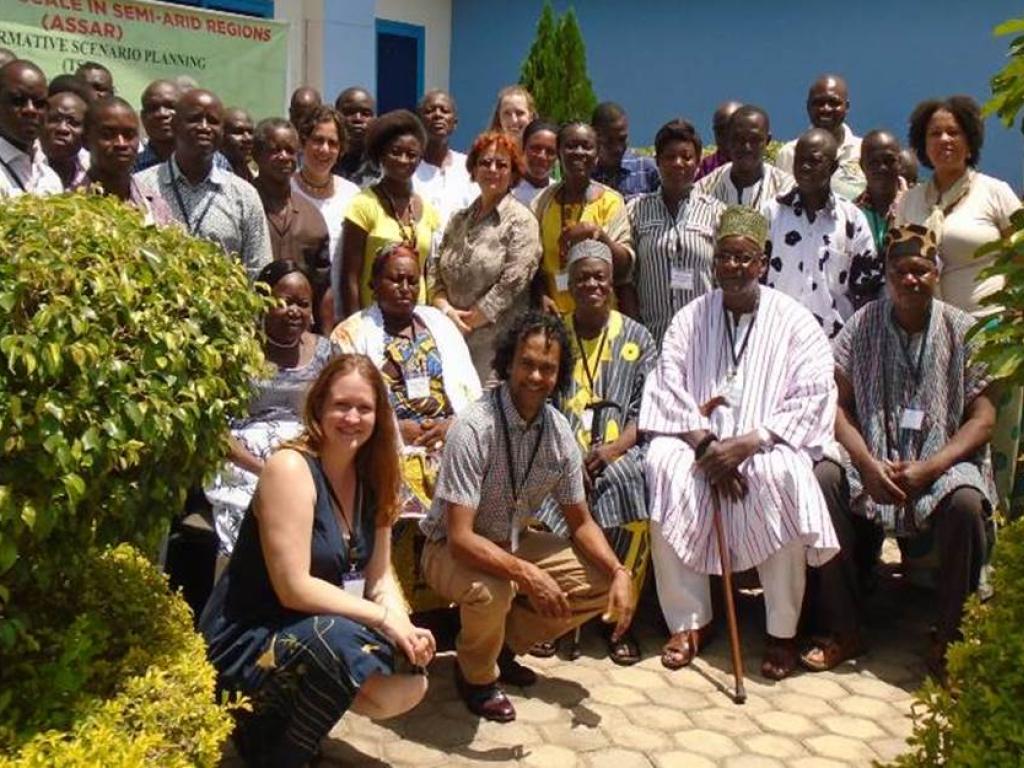
By Prosper Adiku and Mary Thompson-Hall
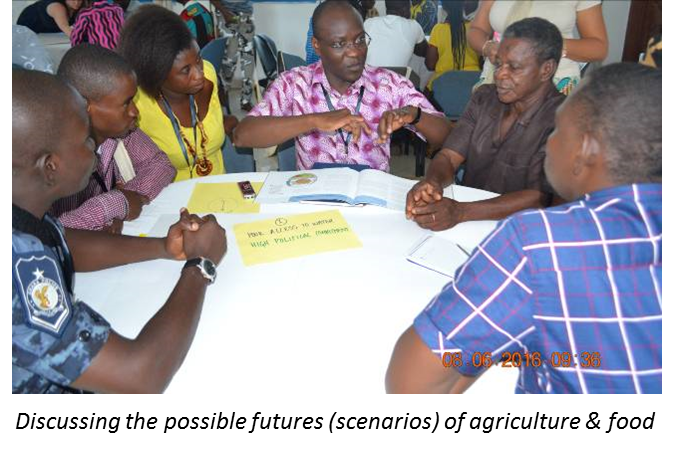
Traditional authorities, representatives of district level public institutions, NGOs, youth and women groups from the Adaptation at Scale in Semi-arid Regions (ASSAR) study area all participated in the first Transformative Scenario Planning (TSP) workshop held in the Upper West Region of Ghana in early June. The two-day workshop was organised by the ASSAR Ghana Team from the Institute for Environment and Sanitation Studies (IESS) of the University of Ghana as part of ASSAR’s ongoing research in the region. The TSP process focused on exploring agricultural and other challenges in semi-arid regions and together building stories of what their future could look like with regards to agriculture and food security. The workshop was facilitated by Karen Goldberg and Dinesh Budhram from Reos Partners in South Africa and was also attended by ASSAR colleagues from START (USA), Michigan State University (USA), ICRISAT (Mali), and Oxfam GB (Ghana). The workshop theme was:
‘What are the possible futures for agriculture and food in the Upper West region of Ghana through to the year 2035?’
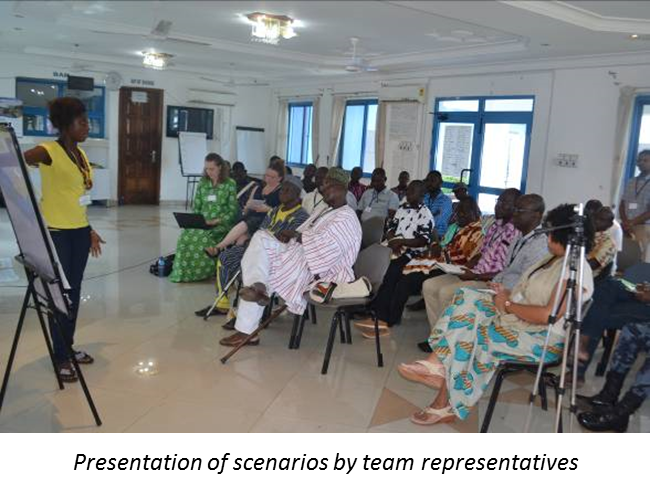
According to Reos Partners, scenarios are“…structured, well considered stories describing a small set of possible future contexts and how they might come about.” TSP is based on exploring the particular issues at play that ‘are or could become unsustainable or unacceptable’, and trying to understand how to navigate towards a more desirable state going forward.
Our TSP process convened four scenario teams from different disciplines and stakeholder groups, including farmers, traditional authorities, district officials, extension officers, women’s groups, youth, media, and savings and loan representatives. Each team focused on food and agriculture issues in Ghana’s Upper West region and:
- observed the current challenges (environmental and non-environmental) that these sectors are facing,
- constructed detailed stories of how these challenges could impact the sectors in future (particularly focusing on the most uncertain and impactful driving forces), and
- explored beneficial pathways for addressing these challenges, sharing ideas on how to bring those future pathways into reality.
The teams identified many factors – such as market availability, good roads, and storage facilities – that could influence the development of agricultural activities in the Upper West Region of Ghana. However, they considered access to water and political commitment as the two major uncertain driving forces that are impacting and will continue to impact, agriculture and food. They then constructed four storylines and scenario frameworks for these sectors based on permutations and interactions of these two major drivers (see graphic below), and used the Social, Economic, Environmental and Political (STEEP) approach to consider how the forces would play out by the year 2035.
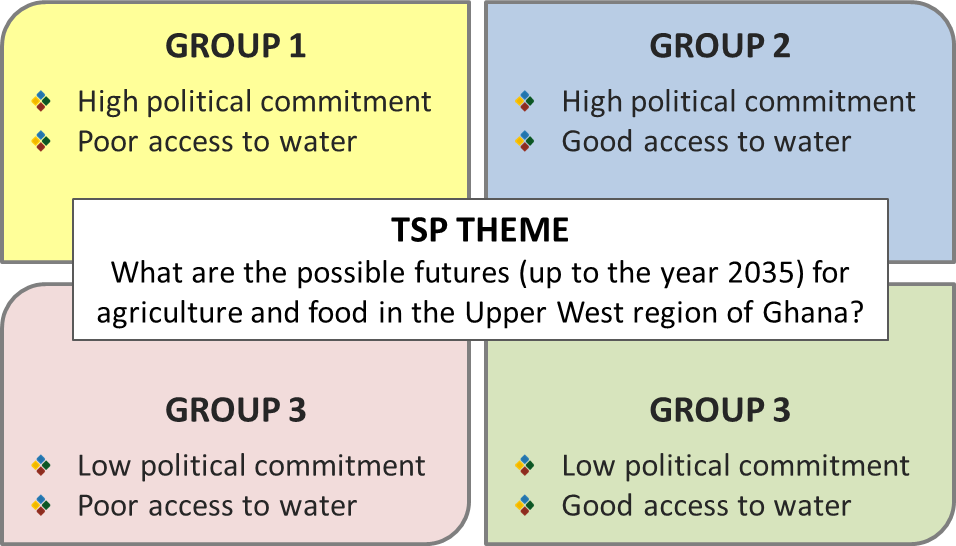
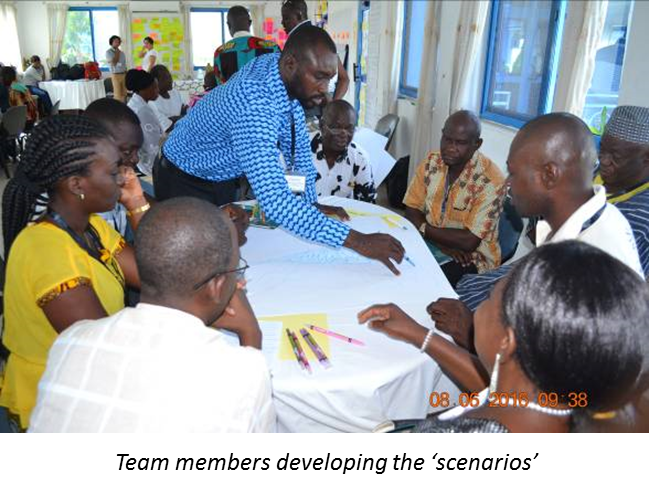
The participants, including the traditional authorities represented by Naa Poawele Karbo (Paramount chief of Lawra Traditional area), Naa Dr. Ernest (representative of the Paramount chief of the Nandom Traditional area) and Naa Jacob Zaabele (sub-chief from Nandom), took very keen interest in the process and promised to support it to its end.
Other participants expressed their enthusiasm to support ASSAR's work and applauded the TSP process for ‘thinking outside the box’ and approaching challenges differently. One of the participants, Freda Pigru (Station coordinator of Radio FREED – a community radio in Nandom) remarked that ‘‘...the whole process from one point to another makes you think wide, think for yourself, think about the future and the future generations to come.”

As a complementary activity to ASSAR’s ongoing research in the Upper West region, and informed by the work of other programs such as the Climate Change, Adaptation and Food Security (CCAFs) program, the workshop also provided participants the opportunity to explore the complexities of the social and environmental context and helped to define what their own roles might be in overcoming the barriers to adaptation.
The outcomes from the TSP will contribute to the next phase of the ASSAR research in the Lawra and Nandom districts by making useful inputs for investigating the most effective ways of dealing with the identified challenges in terms of what might be hindering progress, and what can be done to overcome the barriers. However, the TSP is an ongoing process: while this first workshop focused primarily on stakeholders from the local to district levels, there will be a follow-up workshop in August during which increased engagement and the involvement of stakeholders from all levels of decision making and across a wider range of sectors is expected.
While we drive the process on, we believe we are constantly improving our collaborations with the chiefs and strategic allies who can help our work to have influence and impact in this region.
